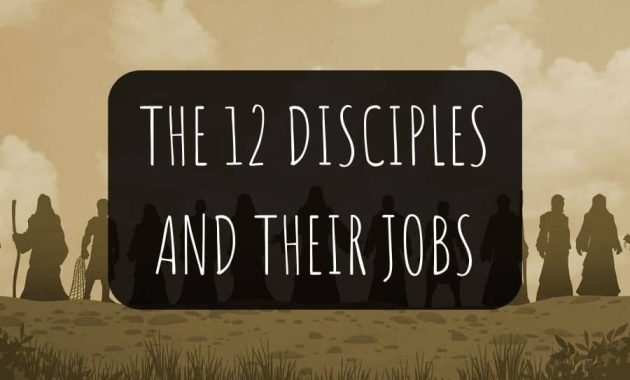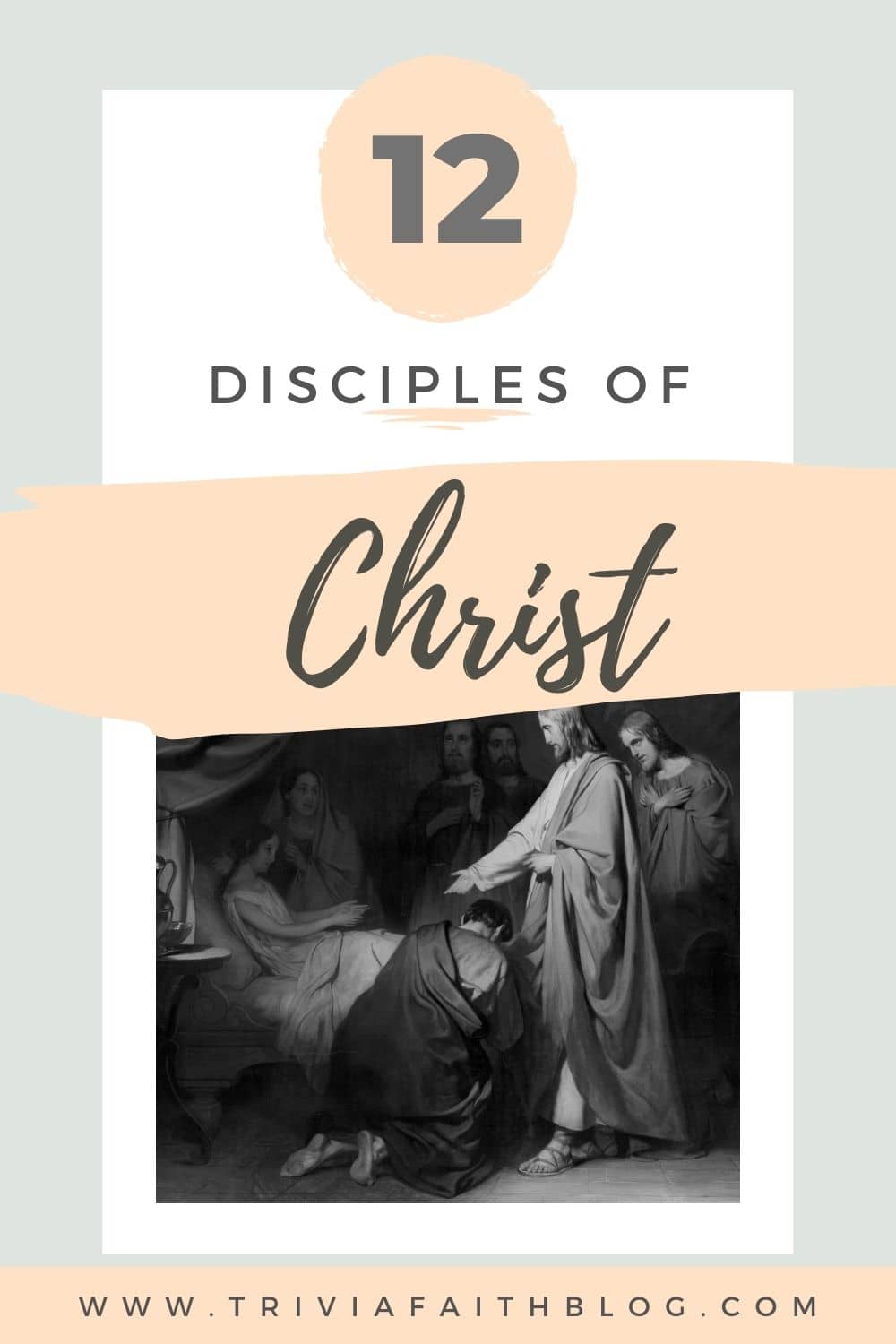The 12 Disciples And Their Jobs
The 12 disciples of Jesus are among the most well-known figures in early Christianity, revered for their roles in spreading the teachings of Christ throughout the world.
While their spiritual contributions are often emphasized, many people are curious about the practical side of their lives, particularly their professions.
What jobs did these men hold before they became disciples? How did their occupations influence their roles in the early Christian church?
In this article, we’ll explore the list of the 12 disciples and their jobs, shedding light on the diverse professions represented among Jesus’ closest followers.
See also: The 12 Disciples Questions and Answers
The 12 Disciples And Their Jobs

Simon Peter
A fisherman from Bethsaida, he was the leader of the disciples and the first to recognize Jesus as the Messiah.
Luke 5:1-3 – “One day as Jesus was standing by the Lake of Gennesaret,[a] the people were crowding around him and listening to the word of God. He saw at the water’s edge two boats, left there by the fishermen, who were washing their nets. He got into one of the boats, the one belonging to Simon, and asked him to put out a little from shore. Then he sat down and taught the people from the boat.”
Andrew
Also a fisherman from Bethsaida, he was the brother of Simon Peter.
Matthew 4:18-19 – “And Jesus, walking by the Sea of Galilee, saw two brothers, Simon called Peter and Andrew his brother, casting a net into the sea; for they were fishermen. Then He said to them, ‘Follow Me, and I will make you fishers of men.'”
James
The son of Zebedee and Salome, he was a fisherman from Bethsaida. He was the brother of John and was also called by Jesus to be a disciple.
Matthew 4:21 – “And going on from there, He saw two other brothers, James the son of Zebedee, and John his brother, in the boat with Zebedee their father, mending their nets. He called them,”
John, son of Zebedee
Also the son of Zebedee and Salome, he was the brother of James. He was a fisherman from Bethsaida and was called by Jesus to be a disciple.
Matthew 4:21 – “A little farther up the shore he saw two other brothers, James and John, sitting in a boat with their father, Zebedee, repairing their nets. And he called them to come, too.”
Philip
Philip was from Bethsaida but no mention of his occupation is given in the Bible.
John 1:43-44 – “The following day Jesus wanted to go to Galilee, and He found Philip and said to him, ‘Follow Me.’ Now Philip was from Bethsaida, the city of Andrew and Peter.
Nathanael
Nathanael was from Cana in Galilee (John 21:2) and no mention of his occupation is given in the Bible.
John 1:45-46 – “Philip found Nathanael and said to him, ‘We have found Him of whom Moses in the law, and also the prophets, wrote-Jesus of Nazareth, the son of Joseph.’ And Nathanael said to him, ‘Can anything good come out of Nazareth?'”
Matthew
Also known as the Levi in the book of Luke, he was a tax collector from Capernaum.
Matthew 9:9 – “As Jesus passed on from there, He saw a man named Matthew sitting at the tax office. And He said to him, ‘Follow Me.’ So he arose and followed Him.”
Thomas
Thomas was also known as Didymus and was from Galilee. He was one of the Twelve and is best known for doubting that Jesus had risen from the dead after being told by the other disciples.
John 11:16 – “Then Thomas, who is called Didymus, said to his fellow disciples, ‘Let us also go, that we may die with Him.'”
James son of Alphaeus
James son of Alphaeus is one of the disciples and often known as James the Less. Not much is known about James son of Alphaeus, including his occupation. The Bible does not provide any specific information on his profession or trade.
Simon who was called the Zealot
The Bible does not provide any specific information about his occupation, but it is believed that before becoming a disciple of Jesus, he may have been a member of a Jewish nationalist group known as the Zealots.
Luke 6:15 – “Matthew, Thomas, James son of Alphaeus, Simon who was called the Zealot,”
Judas son of James
Judas son of James is only mentioned in Luke’s Gospel (Luke 6:16). No mention of his occupation is given in the Bible.
Luke 6:16 – “Judas son of James, and Judas Iscariot, who became a traitor.”
Judas Iscariot
Judas Iscariot is best known for betraying Jesus to the authorities for 30 pieces of silver. He was also a thief and kept the money bag for the group.
John 12:6 – “This he said, not because he cared about the poor, but because he was a thief, and having charge of the moneybag he used to help himself to what was put into it.”

Meaning Of The 12 Disciples’ Names
- Simon: the Greek form of the Hebrew name Simeon, meaning “hearing” or “listening.”
- Andrew: from the Greek name Andreas, meaning “manly” or “masculine.”
- James: from the Greek Iakobos, derived from the Hebrew name Jacob, meaning “supplanter” or “one who takes the place of another.”
- John: from the Greek name Ioannes, which was derived from the Hebrew name Yohanan, meaning “God is gracious.”
- Philip: from the Greek name Philippos, meaning “lover of horses.”
- Nathanael: from the Hebrew name Netan’el, meaning “gift of God.”
- Matthew: from the Greek name Mattathias, meaning “gift of Jehovah.”
- Thomas: from the Greek name Thomas, meaning “twin.”
- James son of Alphaeus: from the Greek Iakobos, derived from the Hebrew name Jacob, meaning “supplanter” or “one who takes the place of another.”
- Simon who was called the Zealot: from the Latin word zelotes, meaning “zealous one.”
- Judas son of James: from the Greek Ioudas, derived from the Hebrew name Yehudah, meaning “praised.”
- Judas Iscariot: from the Greek Ioudas and the Hebrew word qesari, meaning “man of Kerioth” or “one from Kerioth.”
FAQs About The 12 Disciples Of Jesus
How many disciples were fishermen?
As recorded in the Bible, there were four disciples who were fishermen: Simon Peter, Andrew, James, and John. These four men were called by Jesus to follow Him and become "fishers of men" (Matthew 4:18-22). After being commissioned by Jesus, they continued to fish as a means of support while they preached the gospel and shared the good news about Jesus Christ with others.
How many apostles were there?
There were 12 apostles in total: Simon Peter, Andrew, James, John, Philip, Nathanael, Matthew, Thomas, James son of Alphaeus, Simon who was called the Zealot, Judas son of James, and Judas Iscariot. Of these 12 men, Judas Iscariot betrayed Jesus and later committed suicide. The other 11 apostles remained faithful to Jesus and went on to play a key role in the early church.
What is the Apostolic Age?
The Apostolic Age is the period of time in which the apostles lived and preached the gospel. This age began with Jesus' Ascension into heaven and ended with the death of the last apostle, John. During this time, the apostles spread Christianity throughout the world by preaching the gospel and performing miracles in Jesus' name. The Apostolic Age was a time of great growth for the early church, and it laid the foundation for Christianity to continue spreading throughout the world.
What did the 12 disciples do after the Ascension?
The Bible makes us understand that after Jesus ascended to heaven, the disciples received the power of the Holy Spirit as promised by Jesus, and they went out into the world and continued to spread the gospel.
They did everything that Jesus had commanded them to do, including baptizing people in the name of the Father, Son, and Holy Spirit (Matthew 28:18-20). They also performed miracles in Jesus' name (Acts 5:12), preached the gospel to both Jews and Gentiles (Acts 8:4-5; 10:34-35), and continued to grow the early church (Acts 2:41-47).
The disciples' obedience to Jesus' commission resulted in the spread of Christianity throughout the world.
Pin This!

As we can see from the above information, the 12 disciples played a vital role in the early church. They were obedient to Jesus’ commands and went out into the world to share the gospel with others. Because of their faithfulness, Christianity was able to take root and grow throughout the world.






